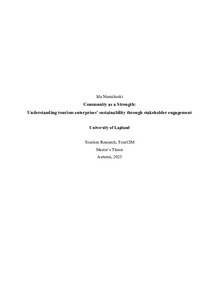Community as a Strength: Understanding tourism enterprises' sustainability through stakeholder engagement
Niemikoski, Ida (2025)
Niemikoski, Ida
Lapin yliopisto
2025
Julkaisun pysyvä osoite on
https://urn.fi/URN:NBN:fi-fe20251023102993
https://urn.fi/URN:NBN:fi-fe20251023102993
Tiivistelmä
The importance of taking responsibility for tourism operations has grown as the tourism industry has steadily increased over the past few decades. Throughout the years, it has been noted that the impacts of tourism can affect destinations through different dimensions, including environmental, social, and economic. Corporate Social Responsibility (CSR) aims to address these issues by providing guidelines for companies to conduct responsible business practices. Responsible tourism practices can improve the destinations’ well-being, as tourism has the potential to influence the local communities. Furthermore, understanding how companies engage with different stakeholders becomes valuable in this sense. For this master´s thesis, it was chosen to study stakeholder engagement in the context of sustainability, and it aims to explain how these two concepts can be viewed as multidimensional.
Previous research on stakeholder engagement, CSR, and sustainability has been widely used around the world in tourism literature. On the other hand, research considering these aspects in Finland has been conducted, with a focus on the northern parts of Finland. To understand these aspects from a different perspective, the research area was chosen to be Suomenlinna due to its unique environment. The main research question is: How does stakeholder engagement affect sustainability in tourism enterprises? The following sub-questions are: 1) How is sustainability perceived within the destination? 2) How does stakeholder engagement affect the relationship between stakeholders? 2) How can stakeholder engagement be used to improve sustainability?
Tourism businesses are drawn to working towards sustainability, but may lack sufficient resources, such as funding or time. The study demonstrates that well-planned and organized stakeholder engagement can enhance sustainability practices within the destination itself, as well as within the tourism enterprises, through effective communication and interaction. The findings present how working together can help to learn from one another. Furthermore, cooperation enhanced trust through familiarity with each other, a sense of community; a village-like feeling was present among the operators, creating an atmosphere of working together towards the same cause. This research highlights the importance of collaboration in tourism. Reflecting on this research, the dedication of the destination demonstrated exemplary execution through engagement in developing tourism together.
Previous research on stakeholder engagement, CSR, and sustainability has been widely used around the world in tourism literature. On the other hand, research considering these aspects in Finland has been conducted, with a focus on the northern parts of Finland. To understand these aspects from a different perspective, the research area was chosen to be Suomenlinna due to its unique environment. The main research question is: How does stakeholder engagement affect sustainability in tourism enterprises? The following sub-questions are: 1) How is sustainability perceived within the destination? 2) How does stakeholder engagement affect the relationship between stakeholders? 2) How can stakeholder engagement be used to improve sustainability?
Tourism businesses are drawn to working towards sustainability, but may lack sufficient resources, such as funding or time. The study demonstrates that well-planned and organized stakeholder engagement can enhance sustainability practices within the destination itself, as well as within the tourism enterprises, through effective communication and interaction. The findings present how working together can help to learn from one another. Furthermore, cooperation enhanced trust through familiarity with each other, a sense of community; a village-like feeling was present among the operators, creating an atmosphere of working together towards the same cause. This research highlights the importance of collaboration in tourism. Reflecting on this research, the dedication of the destination demonstrated exemplary execution through engagement in developing tourism together.
Kokoelmat
- Pro gradu -tutkielmat [4950]
